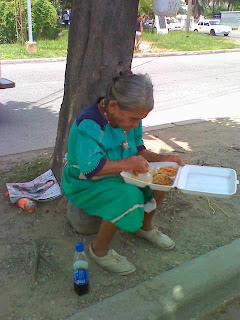I'm a little bewildered by the vast numbers of people who come to Honduras on missions to help the poor. Oh, don't get me wrong: I know there is great need and I believe 100% that their hearts are in the right place, I'm just not so sure that the end result is always worth the cost.
Sometimes there are concrete results: a child is cured, a bridge is built, a family gets a home, a community gets a clean water system, a clinic, a school (for a time anyway − many of these projects fail over time, too). The volunteers often get written up in the local newspapers and invariably the comment is made, "This trip changed my life". If only it were so easy to change someone else's life.
 Many 'voluntourists' come for two weeks. They often don't have any particularly relevant talents except a desire to do something. In some cases they want to teach the poor something that they themselves don't know. Just as an example, I've gotten so many emails from people who say they are coming down next week and want me to teach them about tropical gardening (in a quick email!) so they can teach the poor how to grow vegetables so they will be healthier or more self sufficient.
Many 'voluntourists' come for two weeks. They often don't have any particularly relevant talents except a desire to do something. In some cases they want to teach the poor something that they themselves don't know. Just as an example, I've gotten so many emails from people who say they are coming down next week and want me to teach them about tropical gardening (in a quick email!) so they can teach the poor how to grow vegetables so they will be healthier or more self sufficient. Well, guess what? The poor who aren't growing vegetables don't want to grow vegetables. They don't eat them, don't want to eat them, and may even consider growing vegetables beneath them or beyond their capabilities. There is nothing that you can do that will change their minds. Just because you say that eating vegetables is good for them isn't going to change the culture. If you go back next year or the year after, I'd like to know if they are still growing vegetables! Many of the poor do grow bananas or plantains (which are staples of the diet) if they have space and want to − surely gringos aren't going to come and teach Hondurans how to grow bananas?
 So many people think that if only the poor people know about x, y, or z, it will change their lives. All they need is for a gringo to come and enlighten them. If only it worked that way! You are probably going to meet two kinds of people. One is the kind who will smile and thank you while they are thinking to themselves "this gringo doesn't know a thing about my country or culture." The other is the kind (usually the people with a little more power and influence) who will have a reason why every suggestion just won't work in Honduras and can't even be tried.
So many people think that if only the poor people know about x, y, or z, it will change their lives. All they need is for a gringo to come and enlighten them. If only it worked that way! You are probably going to meet two kinds of people. One is the kind who will smile and thank you while they are thinking to themselves "this gringo doesn't know a thing about my country or culture." The other is the kind (usually the people with a little more power and influence) who will have a reason why every suggestion just won't work in Honduras and can't even be tried.  I don't want to hurt anyone's feelings and I'm not saying that people shouldn't volunteer to help in Honduras. I just think that the longer term volunteers working in their area of expertise who also have a better understanding of the culture and the language have a much better chance of actually making a difference.
I don't want to hurt anyone's feelings and I'm not saying that people shouldn't volunteer to help in Honduras. I just think that the longer term volunteers working in their area of expertise who also have a better understanding of the culture and the language have a much better chance of actually making a difference."Voluntourism" isn't a bad thing, it's just not necessarily the best way to solve the problems of poverty. I strongly suggest that anyone considering volunteering in Honduras read Joann Van Eggen's article, "The cost of short-term missions".
ABC's 20-20 had a special on the poor of the Appalachian mountains last week (which I didn't see) and a follow up this week which talked about some of the effects of the help that had been received (a toothless 30-year-old woman who was getting new teeth, a poor family who was given a house, a medical clinic which received donations, a high school boy received a college scholarship, and so forth).
It got me wondering why more of the people who come to Honduras don't instead go help the poor in their own countries, where they do know the culture and the language, already know what can help someone to succeed in American society, and more importantly, where the people needing help are more likely to respect their opinions. Why are their own countrymen somehow less deserving?
----------
Be sure to read the insightful comments by blogicito readers below, as well as the related guest blogger article and the rebuttal to the guest blogger.


 Welcome to my Blogicito —
Welcome to my Blogicito — 







